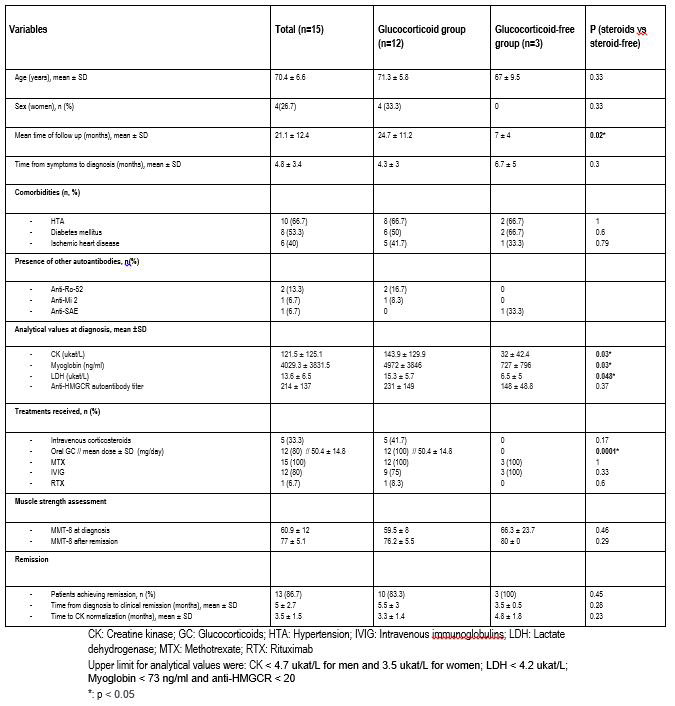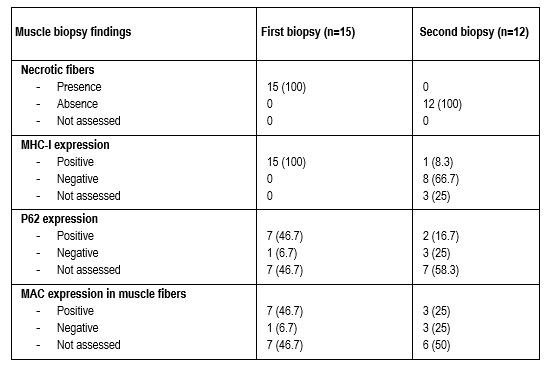Session Information
Session Type: Poster Session D
Session Time: 1:00PM-3:00PM
Background/Purpose: Statin-induced immune mediated necrotizing myopathy (IMNM) is a recently identified autoimmune condition associated with anti-3-hydroxy-3-methylglutaryl-CoA reductase (HMGCR) antibodies, characterized by progressive muscle weakness leading to severe disability.
Muscle biopsy shows presence of necrotic fibers, p62 aggregation, presence of the membrane attack complex (MAC) and expression of major histocompatibility complex (MHC) class I.
Treatment includes glucocorticoids in combination with other immunosuppressive drugs.
Intravenous immunoglobulins (IVIG) have also proved to be effective in the treatment of IMNM.
Our aim was to compare the outcome of IMNM between patients treated with glucocorticoid-free protocols and patients receiving glucocorticoids and to assess the usefulness of a second muscle biopsy in the follow up.
Methods: Patients consecutively diagnosed with statin-induced IMNM at Karolinska University Hospital from January 2018 to November 2021 were included in this study. Clinical data were extracted retrospectively from SweMyoNet (Swedish myositis network register).
IMNM was diagnosed according to the definition of the European Neuromuscular International Workshop 2016. Remission was defined as no disease activity by expert physicians. In patients with significant comorbidities, through shared decision between the physician and the patient, a steroid-free regime was agreed.
All patients underwent a first biopsy prior to the start of the treatment and the second biopsy was performed after 3-28 months. Percutaneous conchotome was used as biopsy method. Muscle samples were obtained from tibialis anterior and second biopsy was performed in the contralateral side. Samples were stained for Hematoxylin-eosin, MHC class I, p62 and MAC. Muscle biopsies were examined by a single muscle pathologist.
Results: We included 15 anti-HMGCR positive patients. Main features of the patients are shown in TABLE 1.
3 patients received a glucocorticoid-free regimen based on MTX in combination with IVIG.
The rest (n=12) received treatment with glucocorticoids in combination with MTX and/or IVIG.
13 of 15 patients achieved clinical remission after a mean time of 5.5 ± 2.7 months.
All 3 patients who did not receive glucocorticoids achieved remission after a median of 3.5 months.
There were no statistically significant differences regarding the time to remission or CK normalization between both groups.
All patients underwent a first muscle biopsy. Thirteen patients also underwent a second muscle biopsy after treatment. One of the biopsies was reported as non-conclusive.
Main data of muscle biopsies can be seen in TABLE 2.
In the first biopsy, all patients had presence of necrotic fibers and expression of MHC-I in muscle fibers. There was also positivity in most cases for p62 and MAC in the muscle fibers.
Regarding the second biopsy findings, no sign of muscle fiber necrosis was found in any patient. MHC-I and p62 and MAC expression was lower in the second biopsy.
Conclusion: In IMNM, treatment with protocols based on the use of IVIG without glucocorticoids might be an option for selected patients.
Performing a control biopsy during the follow-up can be useful to monitor the response to the treatment.
To cite this abstract in AMA style:
Martínez-López D, Szczęsny P, Nennesmo I, Gheorghe K, Notarnicola A, Alexanderson H, Lundberg I, Dastmalchi M. Statin-induced Immune-mediated Miopathy: Treatment with Glucocorticoid-free Protocols and Role of Muscle Biopsy in the Follow-up [abstract]. Arthritis Rheumatol. 2022; 74 (suppl 9). https://acrabstracts.org/abstract/statin-induced-immune-mediated-miopathy-treatment-with-glucocorticoid-free-protocols-and-role-of-muscle-biopsy-in-the-follow-up/. Accessed .« Back to ACR Convergence 2022
ACR Meeting Abstracts - https://acrabstracts.org/abstract/statin-induced-immune-mediated-miopathy-treatment-with-glucocorticoid-free-protocols-and-role-of-muscle-biopsy-in-the-follow-up/


